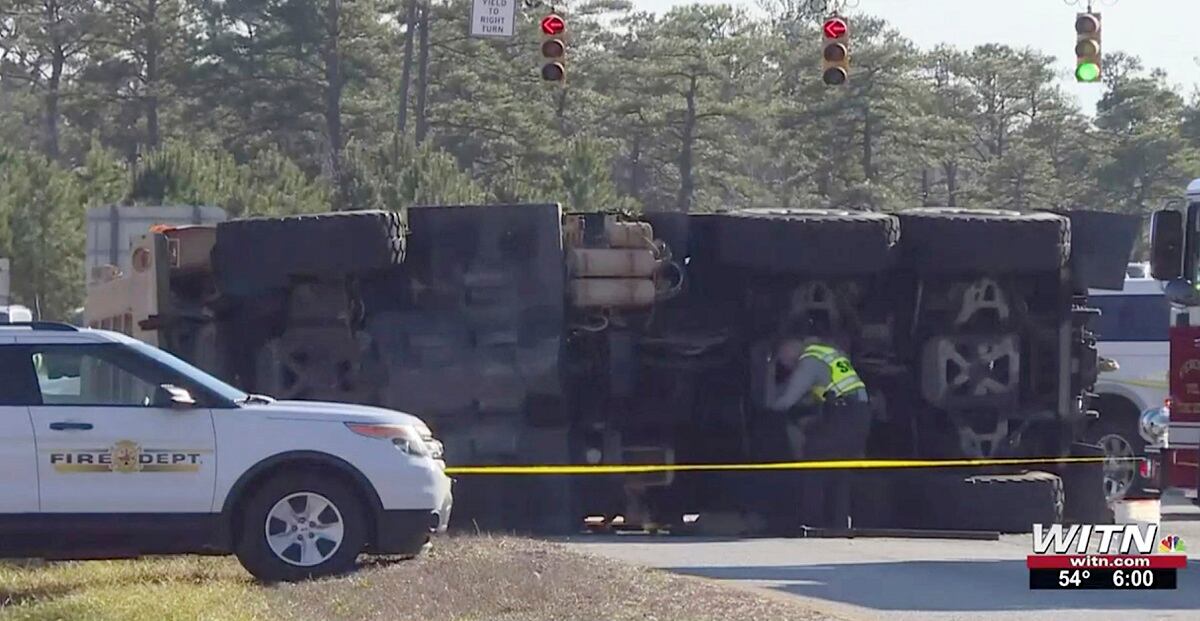As the Marine Corps continues to face pressure from Congress and critics to address deadly vehicle mishaps, it rolled out a survey soliciting Marine drivers’ feelings about their training ― and their bosses.
A Marine administrative message published in May by the commandant of the Marine Corps’ safety division invited vehicle operators to fill out an 18-question survey, including some open-ended questions, that addressed experiences and concerns about driving for the Corps.
The message made clear that the service is investigating the human factors behind mishaps, citing a 2021 Government Accountability Office report that found human error, both on the part of drivers and the leaders they answered to, was responsible for “the majority” of tactical vehicle mishaps.
The online survey “will be used to gain a better understanding of how tactical vehicle operators view a variety of topics, including the quality of training, level of proficiency, and greatest challenges,” the message states. “Participants will also be given the opportunity to provide direct feedback via personal responses.”
RELATED

Unlike many Marine Corps-created surveys, the vehicle operator survey was not CAC-enabled and could be accessed online by anyone. If a survey respondent says they were neither an incidental or a school-trained tactical vehicle driver, they were directed away from the survey. Otherwise it opened up into the full list of questions.
Drivers were asked to provide demographic information, including rank, gender, current division or installation, and driving background, but were not asked for their names. The survey emphasized all information collected would remain anonymous. And data will be reported in the aggregate to shield individual responses.
The first set of questions asked Marines to indicate whether their training and certification programs prepared them properly to drive tactical vehicles, from “strongly disagree” to “strongly agree,” with space to enter additional comments about training. Later, Marines were asked to use the same scale to evaluate the statement, “I feel undue pressure from supervisors to execute tactical vehicle operator tasks.”
Next, Marines were asked to rank the top five factors that most frequently contribute to ground vehicle mishaps, and separately, the top five factors that most affect vehicle safety. The options they could select included: driving error; inattention; fatigue; insufficient experience; inadequate training; supervisory issues; maintenance issues; weather; and vehicle design flaws, among others.
Finally, respondents arrived at a series of open-ended questions soliciting their own experiences. They were asked to describe the greatest challenges drivers face before, during and after a tactical movement, and to retell positive and negative experiences they’ve had with assistant drivers, or A-drivers, and with vehicle commanders.
Respondents were asked to describe an experience in which they’ve felt unsafe as a driver, and then, in conclusion, asked for their own ideas to make tactical vehicle operation safer.
The answers generated from the survey, which was open until July 7, will be compiled and analyzed by the safety division and used to inform policy changes and improvements.
“As always, the goal is to maximize the proficiency and lethality of our forces while minimizing injury to Marine and Sailors, and decreasing equipment damages and loss,” the message states.
While the GAO report showed that the number of serious tactical vehicle mishaps in the Marine Corps had remained relatively stable at about five per year between 2010 and 2019, with a peak of nine mishaps in 2012, public scrutiny of preventable errors and misjudgments has led to high-level calls for change.
In May 2019, Marine 1st Lt. Conor McDowell, a vehicle commander with 1st Light Armored Reconnaissance Battalion, was killed when his light armored vehicle rolled into a ditch during training at Camp Pendleton, California. An investigation would find McDowell was not at fault, but that the sheer and uneven terrain in the training area was responsible for the tragedy.
Advocacy by McDowell’s father, Michael McDowell, led to the creation of a two-year pilot program, passed as part of the fiscal 2023 National Defense Authorization Act, that would put “black box” data recorders on more tactical vehicles in hopes of gathering better data about how and when mishaps take place.
A recent military trial also highlighted the reality, addressed by the survey, that sometimes Marine vehicle operators are pushed into unsafe situations by their chain of command.
In April, Lance Cpl. Luis Ponce-Barrera was acquitted of manslaughter and negligent homicide in a court-martial at Camp Lejeune, North Carolina.
Ponce-Barrera had been the driver in a Jan. 2022 7-ton truck rollover at a highway intersection near the base that killed two Marines and left all the other Marine passengers injured. While Ponce-Barrera’s driving was the proximate cause of the mishap, his defenders ― including some of the parents of the Marine victims ― rallied around him, pointing out that he’d never driven a 7-ton with a turret top until that day, was new to driving military vehicles and hadn’t even gotten his civilian driver’s license when he reported for training the previous year.
McDowell has told Marine Corps Times he is still pushing for additional safety measures, including legislation that would create a new Pentagon position to investigate and hold senior leaders accountable for safety breakdowns and mishaps that happen within their chain of command.
Hope Hodge Seck is an award-winning investigative and enterprise reporter covering the U.S. military and national defense. The former managing editor of Military.com, her work has also appeared in the Washington Post, Politico Magazine, USA Today and Popular Mechanics.





